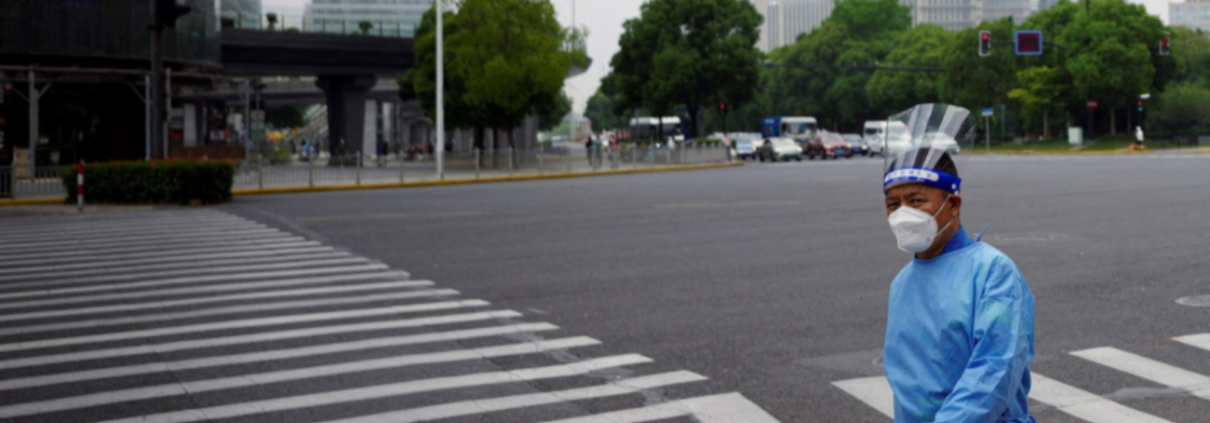China’s Zero-COVID Policy and Its Implications for Indonesia’s Post-Pandemic Economic Recovery
While the rest of the world largely returned to everyday life in 2021, this is not the case in China. While the country was celebrated as one of the “successful” countries in combating the COVID-19 pandemic, many of its cities remain in lockdown two years into the pandemic. While there is growing discontent with this policy, the Chinese government has insisted that the zero-COVID policy is the best policy to handle the pandemic in China. The appointment of Li Qiang, the Party Secretary of Shanghai during the brutal COVID-19 lockdown in early 2022 that harmed the economy, in the 20th National Congress of the Chinese Communist Party as the next premier of China has proven that Xi Jinping has doubled down on China’s continued application of the zero-COVID policy (BBC News 2022).
The continued application of China’s zero-COVID policy has far-reaching implications for Indonesia’s post-pandemic economic recovery, given the interconnectedness of the Indonesian and Chinese economies. Specifically, the zero-COVID policy has disrupted China-Indonesia trade as Chinese factories, and port authorities could not process orders and deliveries effectively during a lockdown. These lockdowns resulted in a disruption to the global supply chain that negatively impacted Indonesia. There is one solution: Indonesia must reduce its economic dependency on China by creating more redundancies and diversifying its international supply chain.
Zero-COVID policy: Zero-Economy policy as well?
The zero-COVID policy has been touted as China’s answer to handling the pandemic ever since the pandemic began. While the application differs across China, it is a policy that will lock down entire cities or neighborhoods if a COVID-19-infected person is found (Gan, 2022). During the lockdown, all citizens must stay inside their homes and (sometimes) could only get out to buy essential supplies. While the medical implications of this policy have been debated, the economic significance is beyond doubt: economic uncertainty spreads across China as factories, and office buildings could be locked down at a moment’s notice. In Shanghai, for example, factories assembling iPhones and other electronics destined for the world market were forced to cease production after the city was temporarily locked down (Hamblen, 2022). This, of course, could disrupt the supply chain around the world.
In the early days of the pandemic, people worldwide looked at China with envy as their countries were battling the worst of the pandemic while life in China continued as usual, more or less (Wallace, 2022). According to official Chinese data, the confirmed COVID case number in China is deficient, which is credited to applying the zero-COVID policy. It seems that China has found an answer to battling the pandemic.
However, in 2022, the situation will be reversed. As life around the world returned to normal due to the massive rollout of COVID-19 vaccines, lockdowns continued to be implemented in China. People worldwide can travel anywhere without needing a PCR test, but people in China must take a PCR test frequently (Reuters, 2022). Worse, entire cities and neighborhoods could be locked down at a moment’s notice when a COVID-19 case is found, disrupting the ordinary course of life. The impact on the economy is tremendous. The Chinese government was forced to lower its economic growth target in 2022 from 5.5% to 3.3% (Shang, 2022).
This does not bode well with the Chinese populace. Many began a toilet revolution by writing their criticisms of the zero-COVID policy on toilet walls (because there are no CCTV cameras in the toilets) (Watanabe, 2022). Chinese experts, too, make calls to ease the zero-COVID policy (Associated Press, 2022). However, Xi Jinping has doubled down on his continued application of the zero-COVID policy despite the economic costs (BBC News, 2022). The appointment of Li Qiang as the next premier of China has confirmed that Xi Jinping intends to continue applying the zero-COVID policy. Li Qiang was the Party Secretary of Shanghai during the harsh lockdowns in early 2022. Therefore, his appointment could be seen as a tacit approval to continue the zero-COVID policy. The insistence on zero-COVID is made worse by the growing concentration of power in the hands of Xi Jinping. As one The Economist (2022) article aptly puts it: “[t]he policy has failed to adapt because no one can say that Mr. Xi is wrong…” Therefore, it is safe to say that the zero-COVID policy will stay for the foreseeable future.
Implications to Indonesia
Indonesia is heavily dependent on China for its international trade. In 2020, according to data published by the Observatory for Economic Complexity, China was the destination for 18.3% of Indonesian exports and the origin of 29% of Indonesian imports. However, the inverse is invalid, as China is not dependent on Indonesia. According to the Observatory for Economic Complexity, Indonesia is the destination of only 1.54% of Chinese exports in 2020 and the origin of only 2.1% of Chinese imports. Therefore, there is no interdependence but dependence. This makes Indonesia highly vulnerable to economic shocks in China that disrupt production in Chinese factories and disrupts shipping port operations.
The zero-COVID policy has already affected China-Indonesia trade. Indonesian imports from China are disrupted as Chinese factories are forced to stop production to comply with the zero-COVID policy (Timorria, 2021). In May 2022, Shanghai’s industrial production dropped by 2.9% compared to March 2022 (Tan, 2022). In June 2022, Beijing’s industrial output fell by 40% compared to June 2021 because of the city’s COVID-19 lockdown (Tang, 2022). All these lockdowns hampered Indonesian imports from China. In March 2022, Indonesia imported $5.36 billion of goods from China. This number dropped to $5.1 billion in April 2022 and $5.075 billion in May 2022 (CEIC, 2022). While other factors may contribute to the drop in imports, China’s zero-COVID policy can be attributed as one of the causes. International purchases become uncertain as factories could cease output the next day due to government orders. Indonesian exports to China are affected, too, as ships could be forced to wait for weeks outside China’s main seaports when the city is locked down, leaving perishables to rot and leaving goods in limbo, frustrating Chinese and Indonesian customers and companies.
However, the impacts go beyond trade. Due to the high level of linkage between the Indonesian and Chinese economies, any maladies in the Chinese economy could also impact Indonesia. Therefore, Indonesia’s economic health depends on the Chinese economy’s health (see Rosen, 2022). Several Indonesian government officials have acknowledged this issue. The Governor of Bank Indonesia, the Indonesian central bank, argued that the continued application of the zero-COVID policy in China, among others, could result in a lower volume of international trade and a rise in the price of commodities (Halim, 2022). Additionally, the Indonesian Minister of Finance, Sri Mulyani Indrawati, implicitly warned that the zero-COVID policy could negatively affect other countries due to China’s economic clout (Antara News, 2022).
Time to Put the Eggs in Many Baskets
The solution, therefore, is simple. Indonesian companies must actively diversify their supply chain to reduce their dependence on China. They could, for example, source their materials from local industries to support the local economy and import goods from elsewhere. The point is to make them more resilient to political risks and to reduce dependency on a particular country (See Rice and Zegart, 2018). ASEAN is an excellent alternative to the emergence of the newly industrialized economies of Vietnam and Cambodia. Businesses could take advantage of the ASEAN Free Trade Area to benefit from reduced tariffs (See Sanjaya, 2022).
The Indonesian government should also encourage businesses to diversify and create more redundancies in their respective supply chains. The government could fast-track free trade deals with many countries to ensure that Indonesian companies can import raw materials and other imports with reduced tariffs. In addition, the government can incentivize companies that seek materials from local industries to bolster national economic resilience.
Of course, things could get more expensive due to the redundancies and not fully benefitting from the giant Chinese economies of scale. However, paying for more expensive items is better than seeing the economy crash due to Chinese economic malaise. The point is not to decouple the Chinese economy. Instead, it is to make many couplings so that the entire system does not come crashing when one of the couples breaks down.
Conclusion
Despite the many hard economic impacts, the Chinese government has insisted that the zero-COVID policy must continue as it is the best policy to handle the pandemic. Therefore, it is safe to say that the zero-COVID policy will be implemented for the foreseeable future. This could impact the Indonesian economy as it is highly interlinked with the Chinese economy. Trade is disrupted, and the health of the Indonesian economy is dependent on the Chinese economy. The solution, therefore, is to reduce Indonesian economic dependence on China by buying from local industries or importing goods from elsewhere.
References
Antara News. (2022, May 30). Menkeu terus waspadai dampak “lockdown” di China. Antara News. https://www.antaranews.com/berita/2909329/menkeu-terus-waspadai-dampak-lockdown-di-china
Associated Press. (2022, August 30). Chinese thinktank makes rare public call for Beijing to ease zero-Covid policy. The Guardian. https://www.theguardian.com/world/2022/aug/30/chinese-thinktank-makes-rare-public-call-for-beijing-to-ease-zero-covid-policy
BBC News. (2022, October 16). China congress: Xi Jinping defends zero-Covid as party meeting opens. BBC News. https://www.bbc.com/news/world-asia-china-63226230
CEIC. (2022). Indonesia | Total Impor dari China | 1988 – 2022 | Indikator Ekonomi | CEIC. Www.ceicdata.com. https://www.ceicdata.com/id/indicator/indonesia/total-imports-from-china
Gan, N. (2022, November 2). China Is Caught in a zero-Covid Trap of Its Own Making. CNN. https://www.cnn.com/2022/11/02/china/china-covid-foxconn-tibet-disney-intl-hnk/index.html
Halim, F. (2022, May 24). BI Ungkap Dampak Kebijakan Zero Covid China ke Ekonomi Global. Www.viva.co.id. https://www.viva.co.id/berita/bisnis/1478232-bi-ungkap-dampak-kebijakan-zero-covid-china-ke-ekonomi-global?page=1
Hamblen, M. (2022, May 9). Shanghai’s zero-Covid policy weighs on electronics. Fierce Electronics. https://www.fierceelectronics.com/sensors/shanghais-zero-covid-policy-weighs-electronics
Reuters. (2022, November 3). Factbox: What is China’s zero-COVID policy and how does it work? Reuters. https://www.reuters.com/world/china/what-is-chinas-zero-covid-policy-how-does-it-work-2022-11-03/
Rice, C., & Zegart, A. (2018). Political Risk: How Businesses and Organizations Can Anticipate Global Insecurity. Twelve.
Rosen, D. H. (2022, April 15). The Age of Slow Growth in China. Foreign Affairs. https://www.foreignaffairs.com/articles/china/2022-04-15/age-slow-growth-china
Rudd, K. (2022). The Avoidable War: The Dangers of a Catastrophic Conflict between the US and Xi Jinping’s China. PublicAffairs.
Sanjaya, T. (2022, May 13). Why (and How) Indonesia must Reduce its Economic Dependence on China. Modern Diplomacy. https://moderndiplomacy.eu/2022/05/13/why-and-how-indonesia-must-reduce-its-economic-dependence-on-china/
Shang, J. W. (2022, October 13). Is the Benefit of China’s Zero-COVID Policy Worth the Cost? Project Syndicate. https://www.project-syndicate.org/commentary/zero-covid-china-economy-costs-benefits-by-shang-jin-wei-2022-10
Tan, C. (2022, May 16). China economy hit in April as zero-COVID slams brakes on growth. Nikkei Asia. https://asia.nikkei.com/Economy/China-economy-hit-in-April-as-zero-COVID-slams-brakes-on-growth
Tang, F. (2022, June 23). Where was the economic fall out worse in May – Beijing or Shanghai? South China Morning Post. https://www.scmp.com/economy/china-economy/article/3182810/chinas-zero-covid-policy-hammered-beijings-economy-may-how
The Economist. (2022, October 13). An obsession with control is making China weaker but more dangerous. The Economist. https://www.economist.com/leaders/2022/10/13/an-obsession-with-control-is-making-china-weaker-but-more-dangerous
Timorria, L. F. (2021, August 26). Pertumbuhan Ekspor RI ke China Bisa Lebih Tinggi dari Impor. Bisnis.com. https://ekonomi.bisnis.com/read/20210826/12/1434542/pertumbuhan-ekspor-ri-ke-china-bisa-lebih-tinggi-dari-impor
Wallace, J. L. (2022, May 21). Op-Ed: The catastrophic success of China’s zero-COVID policy. Los Angeles Times. https://www.latimes.com/opinion/story/2022-05-21/china-zero-covid-policy-shanghai-lockdowns
Watanabe, S. (2022, November 2). Chinese vent anger over zero-COVID: “When can we lead a free life?” Nikkei Asia. https://asia.nikkei.com/Spotlight/Coronavirus/Chinese-vent-anger-over-zero-COVID-When-can-we-lead-a-free-life
.










Leave a Reply
Want to join the discussion?Feel free to contribute!